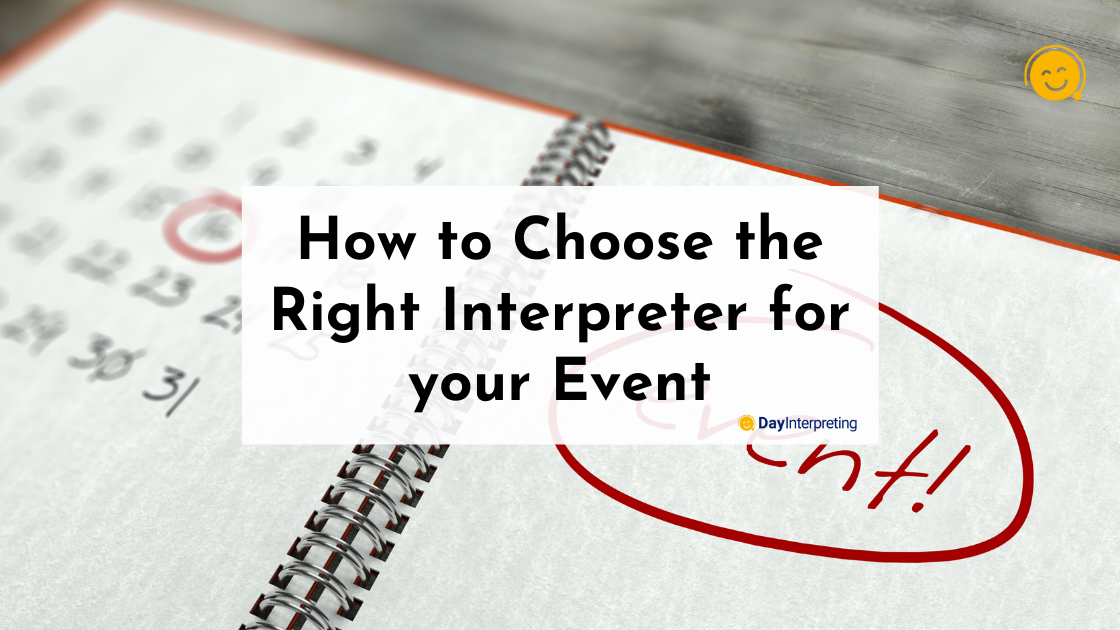For any event planning to be complete, there should be interpretation services. And if it is an international event, you especially can’t get away without interpreters. You may have a problem when people from all over the world show up and your speakers only speak one language. So, what’s the best way to choose the right interpreter for your event?
To ensure that there’s no communication breakdown at your event, you’ll need interpreters. But choosing interpreters isn’t always an easy task. Plus it gets worse if you’re a beginner with no experience hosting events. To avoid falling into the trap of subpar interpreters there are a few qualities to look for.
Qualities to Look for if You Need to Choose the Right Interpreter for Your Event
Excellent Language Mastery
Interpreters must have a mastery of their language pairs. This means that as soon as they hear words they should be able to understand. This makes it easy for them to translate without much time to second guess. Since most event translations happen while the speaker is talking there is no time for an interpreter to go through a dictionary or ponder the right meaning of what the speaker is saying.
Language mastery entails a wide vocabulary and understanding of expressions. These can include idiomatic expressions, humor, nuances, and metaphors that their interpreter can communicate.
Professional Accreditation
An interpreter that has certification in interpretation has likely put in the work. This type of interpreter inspires confidence in their ability to make accurate interpretations. Certification also shows an interest in improving their skills to a professional level.
Another plus from accreditation is that the interpreter will understand the rules. There are rules within which interpretation occurs. If the interpreter strays from these rules then the quality of their work may be poor.
Cultural Awareness
A good interpreter should have a cultural awareness of their language pairs. This will help them to capture cultural nuances between their languages. Take for instance, if a speaker makes a joke that only people in a certain setting may understand. A good interpreter will have an idea of how to interpret the joke for their current audience.
Interpreting cultural nuances can only be possible when the interpreter has cultural awareness. And in simultaneous interpretation, for instance, there are nonverbal cues. If the interpreter isn’t aware of cultural nuances it may be difficult to translate these.
Specialty Prowess
Most interpreters interpret specific types of events. These events are often on a specific topic. These topics include medicine, health, finance, law, physics, or even engineering. A good interpreter often has a specialization.
This means that they dedicate their time to hone their craft in a specific topic. This helps to build their vocabulary and their mastery of the subject. With good mastery of the subject matter, the quality of interpretation is almost sure. You don’t want to risk taking chances on a jack of all trades who is a master of none.
Excellent Soft Skills
A good interpreter should be able to connect with the audience. To do this, they’ll need to be comfortable as they translate into the new language. A native listener will know when the interpreter is out of their depth. To avoid such cases, it is important that your interpreter connects with the audience.
A good place to start when trying to connect with the audience is language mastery. A good interpreter should know their language pairing better than most natives would. This, coupled with cultural awareness will help them to be more comfortable as they work. As a result, the listeners will be able to follow the speech.
If listeners hear mistakes it will distract them from listening to the speech.
Exemplary Self-Control
Every interpreter needs to have some level of self-control. Different people speak in different ways. Some people speak fast, some slower while others have heavy accents. If you get impatient for whatever reason, it may show in your voice. Getting frustrated for whatever reason is not a good look for an interpreter.
This is why interpreters need to exercise self-control and remain professional. Adding emotions that the speaker didn’t express is contorting the message. This is very important when it comes to legal or medical translations.
Expressing surprise in your voice because of something the speaker said is wrong. If anything, it goes against the code that guides interpreters in different fields. Interpreters with high emotional resilience should be able to maintain this code.
Where to Find Good Interpreters
With these qualities in mind, it is now easier to choose the best interpreters for your event. This way, you’ll avoid trial and error while hoping you find one by pure luck.
A good place to start when choosing interpreters is from an interpretation service. Day Interpreting offers quality interpretation services for all kinds of events. Regardless of size or subject, we have qualified and experienced interpreters. This is why you should call us when you’re next hosting an event. Our team of interpreters will help you communicate better with your audience.





0 Comments